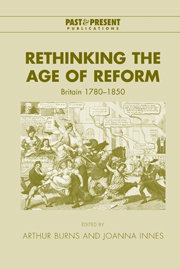Book contents
- Frontmatter
- Contents
- Notes on contributors
- Preface
- List of abbreviations
- 1 Introduction
- 2 ‘Reform’ in English public life: the fortunes of a word
- 3 Parliament, the state, and ‘Old Corruption’: conceptualizing reform, c. 1790–1832
- 4 ‘Old wine in new bottles’: the concept and practice of law reform, c. 1780–1830
- 5 English ‘church reform’ revisited, 1780–1840
- 6 Medicine in the age of reform
- 7 British antislavery reassessed
- 8 ‘The age of physiological reformers’: rethinking gender and domesticity in the age of reform
- 9 Reforming the aristocracy: opera and elite culture, 1780–1860
- 10 Reform on the London stage
- 11 Reforming culture: national art institutions in the age of reform
- 12 Irish reform between the 1798 Rebellion and the Great Famine
- 13 Empire and parliamentary reform: the 1832 Reform Act revisited
- 14 Reforms, movements for reform, and possibilities of reform: comparing Britain and continental Europe
- Index
- Past and Present Publications
Preface
Published online by Cambridge University Press: 15 December 2009
- Frontmatter
- Contents
- Notes on contributors
- Preface
- List of abbreviations
- 1 Introduction
- 2 ‘Reform’ in English public life: the fortunes of a word
- 3 Parliament, the state, and ‘Old Corruption’: conceptualizing reform, c. 1790–1832
- 4 ‘Old wine in new bottles’: the concept and practice of law reform, c. 1780–1830
- 5 English ‘church reform’ revisited, 1780–1840
- 6 Medicine in the age of reform
- 7 British antislavery reassessed
- 8 ‘The age of physiological reformers’: rethinking gender and domesticity in the age of reform
- 9 Reforming the aristocracy: opera and elite culture, 1780–1860
- 10 Reform on the London stage
- 11 Reforming culture: national art institutions in the age of reform
- 12 Irish reform between the 1798 Rebellion and the Great Famine
- 13 Empire and parliamentary reform: the 1832 Reform Act revisited
- 14 Reforms, movements for reform, and possibilities of reform: comparing Britain and continental Europe
- Index
- Past and Present Publications
Summary
This book began life as a Past and Present conference of the same title, held at St Anne's College, Oxford, in July 2000. We are grateful to the editorial board of Past and Present for their generous subsidy, and to Charles Philpin for his practical assistance. The conference was a memorably lively collaborative experience, and we would like to thank all the participants very warmly. We selected from the papers given those that we thought would make a coherent volume; we also owe much to those speakers whose papers are not included here: John Belchem, David Eastwood, James Epstein, Peter King, Tim Larsen, Rohan McWilliam, and Gareth Stedman Jones. Unfortunately, the death of Robbie Gray deprived us of the chance to include a reworked version of his paper. We owe a particular debt to Paul Langford and Peter Mandler, who helped to launch an extremely wide-ranging and stimulating final discussion.
Arthur Burns acknowledges with gratitude the ‘long eighteenth-century’ seminars at the Institute of Historical Research, which have provided him with regular opportunities to consider the interrelations between reform projects in the late eighteenth and early nineteenth centuries. For him the 2000 conference realized a long-standing ambition to explore connections and discontinuities between his own work on church reform and that of scholars working on other contemporary reform projects. Friends and colleagues have sustained this ambition through encouragement and stimulating discussion: he would like to thank David Eastwood, Boyd Hilton, Peter Mandler, the late Colin Matthew, Jon Parry, Mark Smith, Miles Taylor, Stephen Taylor, Dror Wahrman, and above all his co-editor.
- Type
- Chapter
- Information
- Rethinking the Age of ReformBritain 1780–1850, pp. xi - xiiPublisher: Cambridge University PressPrint publication year: 2003

